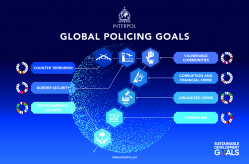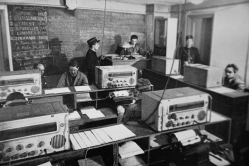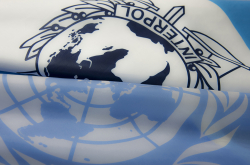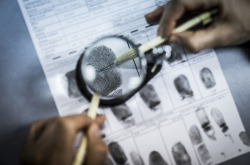How we connect
We connect police around the world – both technically and in person – bridging jurisdictions, time zones and languages.
INTERPOL is unique. It is the only organization with the mandate and technical infrastructure to share police information globally.
All 196 member countries are connected to each other and to the General Secretariat via a secure communications system called I-24/7. It also allows them to access our databases and services in real-time, from both central and remote locations.
We also coordinate networks of police and experts in different crime areas, who come together through working groups and at conferences to share experiences and ideas.
Past / present / future
INTERPOL’s international radio network was launched in 1935, providing an independent telecommunications system solely for the use of the criminal police authorities at national level. Today, millions of messages are transmitted annually via a secure, web-based, police communications system, accessible to 196 countries.
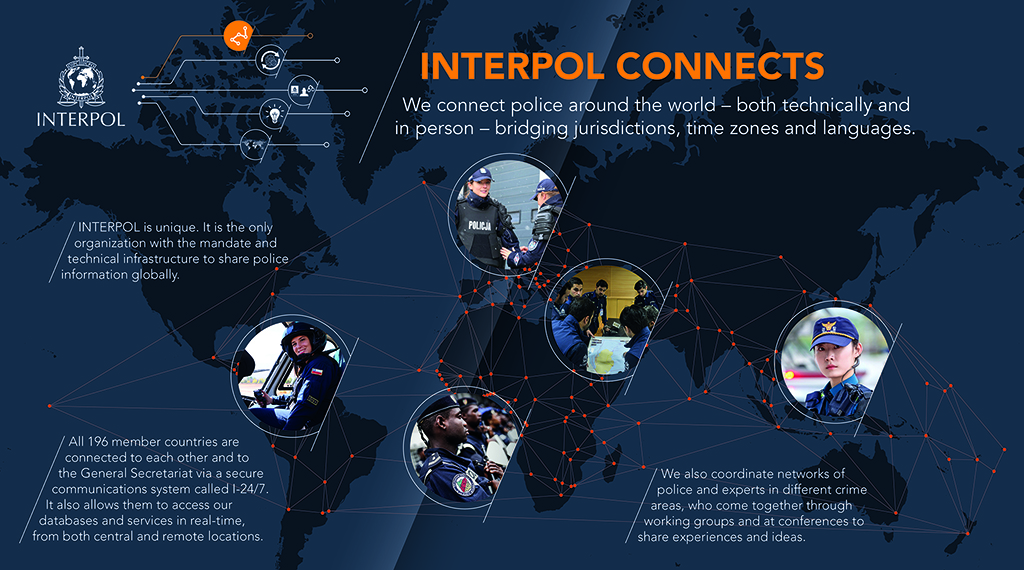
How we empower
We empower law enforcement agencies to make a long-term difference to their national security.
We provide police with the knowledge, skills, and sustainable tools needed to meet today’s challenges.
We offer investigative support, such as forensics and assistance in locating fugitives around the world, as well as coordination support for on-the-ground operations.
Training is an important part of what we do so that officials know how to work efficiently with our services and embed best practices into their ongoing work.
The National Central Bureaus in our member countries are at the heart of how we work. By accessing INTERPOL’s global capabilities they can make a difference to their regional, national and local communities.
Past / present / future
Fingerprint evidence has played a crucial role in criminal investigations since the early days of international policing when paper prints were shared and manually compared. In 2000, we introduced an automatic fingerprint identification system (AFIS) to dramatically reduce the time needed to carry out fingerprint checks.
Today, the range of biometrics – fingerprints, DNA profiles and facial images – combine to help police across the world to make connections between criminals and crime scenes.
The importance of police training was formally recognized in 2007. The approach has since evolved from in-person to digital training. This trend was accelerated by the COVID-19 pandemic which prompted a major shift, with 75% of courses being delivered online in 2020 and 2021.

How we alert
We are the global hub for criminal data, with mechanisms for alerting our member countries when action is needed.
Police need up-to-date global data on criminals in order to carry out successful international investigations. Our 19 databases contain millions of records with information on people, stolen property, weapons, and more. Every hit can help move an investigation forward. This can happen in real-time as a database search will return a result in just 0.5 seconds on average.
Our flagship system of notices enables countries to share alerts and requests for information worldwide, while criminal intelligence analysis gives insight into the inner-workings and driving factors of crime phenomena and criminal enterprises.
Past / present / future
The first Red Notice was issued in 1947 for a Russian man wanted for murdering a policeman. The system of colour-coded international notices was expanded over the years to cover missing persons (yellow), additional information (blue), unidentified bodies (black), warnings and intelligence (green), imminent threats (orange) and modus operandi (purple). The most recent, launched in 2005, is the INTERPOL–United Nations Security Council Special Notice for groups and individuals under UN sanctions.
In 1993, an analytical criminal intelligence unit was set up at the General Secretariat. Today, innovative projects under our I-CORE programme will harness new technology to turn big data into actionable intelligence at the front line.
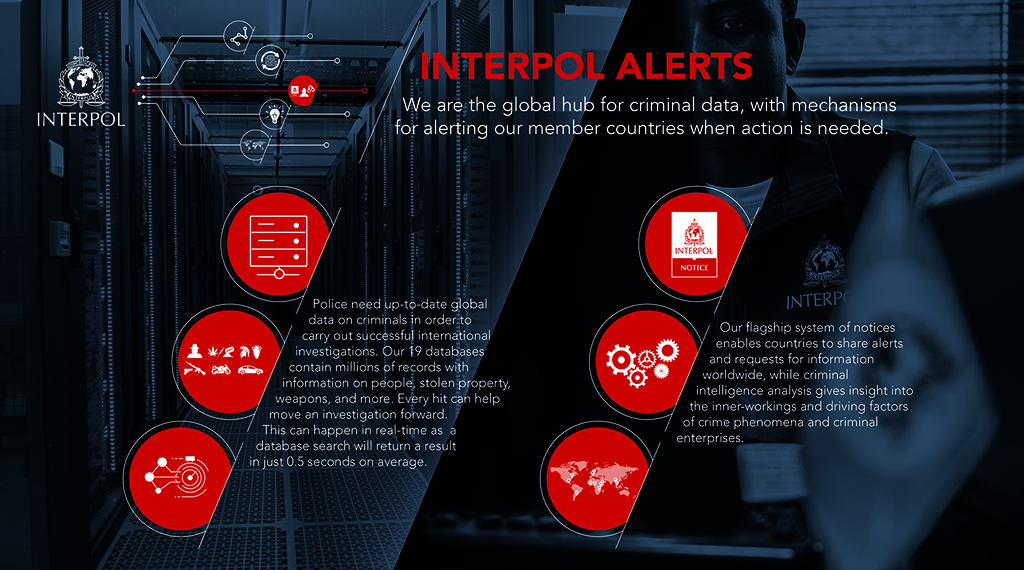
How we innovate
We constantly innovate to stay on top of policing issues in today’s fast-changing world.
Technology, such as artificial intelligence, can be a threat to security but can also be a tool for police and a source of evidence.
Since crimes evolve, we keep an eye on the future through research and development in international crime and trends.
INTERPOL has been a constant presence in international security over the last 100 years, evolving and innovating continually, and will remain relevant in the future.
Past / present / future
In the coming decades, technological advances will continue to blur the boundaries between the physical and the digital.
2023, our centenary year, is an opportunity to look ahead, to share our research on the challenges and opportunities for policing in the future, and to announce our ideas for how INTERPOL’s products and services will evolve to help the global law enforcement community prepare for these transformations.
Innovation is not simply about technology. INTERPOL has proven its ability to change and grow over the years.

How we advocate
As the voice of global law enforcement, we represent police in the international arena.
INTERPOL gives a voice to its membership on the global stage while maintaining its neutrality and inspiring trust.
We champion the cause of policing with governments, international organizations and regional bodies in order to effect change.
Our seven Global Policing Goals form the basis for advocacy before national governments. The goals are aligned with the United Nations 2030 Agenda for Sustainable Development.
Looking to the future, we also invest in the next generation of global police leaders, to ensure fresh and relevant voices continue to be heard.
Past and present
INTERPOL was created in 1923 with 20 member countries. Today, the number has reached 196. This brings with it both the responsibility and the opportunity to coordinate among all the different players to maintain a robust global security architecture.
Partnerships with other international organizations are essential for INTERPOL to fulfil its mission. Collaboration with the United Nations has been continually strengthened over the decades, notably with the opening of an INTERPOL office at the UN in New York in 2004. Other major partners include Europol, the European Union and the African Union, where offices were opened in 2007, 2009 and 2016 respectively

Related news

91st INTERPOL General Assembly
28 November 2023
UK woman murdered in Belgium identified after international appeal
14 November 2023




